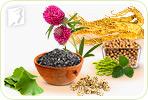Perimenopause surprises most women with intense symptoms, most of which are completely unfamiliar. Although going through this life stage is inevitable, there is an abundance of ways to treat perimenopause symptoms, ranging from easy, natural lifestyle changes and alternative options to more advanced, pharmacological methods.
Keep on reading to find out how to treat perimenopause symptoms to help you pass through this life phase in the healthiest and easiest way!
Three Approaches to Treating Perimenopause Symptoms
Women can consider three approaches to treating perimenopause symptoms: (1) Lifestyle changes, (2) Alternative medicine, and (3) Conventional medicine. They are encouraged to start with the most natural options and explore other, more advanced options only when needed.
Lifestyle Changes for Perimenopause Symptoms Treatment

The first-level of perimenopause treatment involves making healthier lifestyle adjustments, which can bring tremendous benefits for women's physical and mental health. While it carries no risks, it demands the strongest willpower.
Nutritious Diet
Taking a closer look at one's diet is a good place to start. Creating a well-balanced menopausal diet now will benefit a woman's health throughout perimenopause and far into postmenopause. It should contain ample supplies of wholesome foods, such as vegetables, whole grains, and fruits, that are rich in the following nutrients:
- Complex carbohydrates are rich in fiber, which helps prevent sudden spikes of blood sugar, manage weight gain, and sustain energy for longer.1
Quinoa, amaranth, oats, legumes, millet, nuts
- Lean protein, especially coming from plant sources,has been found to help reduce the severity of perimenopause symptoms and maintain hormonal balance more effectively.2
Chicken, fish, eggs, beans
- Healthy fats -mono- and polyunsaturated fats -have been shown to lower the frequency and severity of hot flashes and night sweats.3
Flax, olive oil, avocado, nuts, sacha inchi
- Phytoestrogens are plant-based compounds with weak estrogenic actions that have been shown to ease hormonal fluctuations and the symptoms they trigger.
Soy, oats, chickpeas, mung beans
Regular Exercise
Another area women passing through perimenopause are encouraged to evaluate is their level of physical activity. Among the numerous benefits of exercising during menopause are better weight gain management, osteoporosis prevention, mood swings control, and more.4
Amount: Women are encouraged to engage in at least 30 minutes of moderate aerobic workouts a day, five times a week, or 75 minutes of vigorous exercise weekly.5
Type: To strengthen the body, improve blood flow, and reduce menopause symptoms, women should combine cardio workouts - brisk walking or swimming - with strength training exercises, like squats or yoga.
Useful tips: To prevent triggering hot flashes, women should wear loose, natural sportwear, drink enough water, and exercise in ventilated spaces or outdoors.
Precautions: Because some women find that exercising too late in the afternoon increases the frequency of night sweats, it is important to adjust one's workout schedule accordingly.
Wholesome Habits
With a healthy diet and regular physical activity, women will be on the right track to relieving perimenopause symptoms. As an added bonus, improving other daily practices can strengthen and extend these benefits.
Relieving stress is a key component of treating perimenopause symptoms, which are known to be emotionally and physically draining. Meditation, deep breathing, and biofeedback are some of the best stress-relief options.
Getting enough sleep can help counteract some of the negative effects perimenopause symptoms have on women's health. It also improves energy, focus, and helps maintain good mood.
Using water-based vaginal lubricants or moisturizers can alleviate vaginal dryness and make sex less painful or uncomfortable.
Creating a support network of friends and family is important during perimenopause as women are plagued with bothersome symptoms and try to find themselves in this new life phase.
Avoiding triggers can help reduce the frequency of symptoms.This can include avoiding synthetic clothes and spicy foods for hot flashes, known or suspected allergens for allergies, or toxic relationships for mood swings.
Quitting addictions to smoking and excess alcohol drinking is a must during perimenopause. Nicotine and alcohol have been found to worsen hormonal imbalance, lead to chronic conditions, and trigger various symptoms.6,7
Alternative Medicine for Perimenopause Symptoms Treatment

The second-level perimenopause treatment involves alternative medicine, most commonly herbal supplements. Their numerous benefits include being easy to use, causing no side effects, and addressing the underlying cause of perimenopausal symptoms, hormonal imbalance.
There are two types of herbal supplements from which women can choose during perimenopause: phytoestrogenic and hormone-regulating supplements.
Phytoestrogenic Supplements
Phytoestrogenic supplements, like black cohosh, contain phytoestrogens, that exert weak estrogenic effects in the body. By balancing estrogen levels, they help stabilize other reproductive hormones, like progesterone, to alleviate symptoms, from hot flashes and mood swings to vaginal dryness and insomnia. To avoid dependency and worsening of hormonal imbalance, phytoestrogenic supplements are recommended to be used short-term.
Hormone-Regulating Herbal Supplements
Hormone-regulating supplements, like Macafem, work by providing the body with beneficial alkaloids instead of outside hormones. They gently nourish the hormonal glands and stimulate their own hormone production, thus alleviating perimenopause symptoms. As such, these supplements are considered one of the safest and most effective long-term options for women during perimenopause.
From Nature and Health Magazine, Dr. Chacon says:
"Macafem's nutrients help restore natural hormones in women. Unlike hormone drugs, which are basically resumed in taking synthetic hormones, Macafem acts totally different in your body. It nourishes and stimulates your own natural hormone production by inducing the optimal functioning of the pituitary and endocrine glands." Click on the following link to learn more about Macafem.
Combining lifestyle changes and herbal supplements is oftentimes sufficient to keep perimenopause symptoms at bay. However, for women with severe symptoms, more conventional approaches may be more appropriate.
Conventional Medicine for Perimenopause Symptoms Treatment

The third-level perimenopause treatment -medications and psychotherapy - may involve the highest costs and risks of side effects. Nevertheless, they are a vital treatment option to consider for severe symptoms.
Medications
The choice of medications for perimenopause symptoms will depend on their type, cause, and severity of symptoms as well as a woman's health status and family history. Because of potentially serious side effects they may cause, their use is evaluated on an individual basis. They may include the following:
Antidepressants can be given to women to relieve perimenopause symptoms, including depression and severe hot flashes.
Low-dose birth control pills may be prescribed to manage irregular periods, relieve vaginal dryness, and lessen the effects of hormonal fluctuations.
Vaginal estrogen works on vaginal tissue to alleviate dryness and improve painful intercourse. It does not affect the whole body as systemic hormonal therapy does.
Hormone replacement therapy (HRT) contains estrogen, progesterone, or their combination. It was once an effective treatment for menopause symptoms. However, systemic HRT is now only reserved for severe symptoms as it has been found to increase the risk of serious side effects and health risks, as shown in the studies below.
Psychotherapy
Some women who struggle with depression, anxiety, or severe mood swings may benefit from psychotherapy, including cognitive behavioral therapy (CBT) and interpersonal therapy (IPT).
The above approaches can be applied in any combination to treat perimenopause symptoms, according to individual needs. However, more and more women manage to safely relieve their symptoms with lifestyle changes and herbal supplements without ever having to rely on pharmacological options.
A Safe Way of Treating Perimenopause Symptoms
Implementing Lifestyle Changes:
- Eating balanced meals with complex carbs, healthy fats, and protein
- Keeping up with at least 150 minutes of moderate exercise weekly
- Relieving stress with deep breathing, meditation, and biofeedback
- Quitting addictions to smoking and excessive alcohol drinking
And Taking Herbal Supplements:
- Phytoestrogenic herbal supplements, like black cohosh
- Or natural hormone-regulating supplements, like Macafem
Sources
- American College of Obstetricians and Gynecologists. (n.d.). The Menopause Years. Retrieved July 17, 2020 from https://www.acog.org/patient-resources/faqs/womens-health/the-menopause-years
- Cleveland Clinic. (2019). Menopause, Perimenopause and Postmenopause. Retrieved July 17, 2020 from https://my.clevelandclinic.org/health/diseases/15224-menopause-perimenopause-and-postmenopause
- Harvard Health Publishing. (2020). Perimenopause: Rocky Road to Menopause. Retrieved July 17, 2020 from https://www.health.harvard.edu/womens-health/perimenopause-rocky-road-to-menopause
- Journal of Women's Health. (2016). Perimenopause: From Research to Practice. Retrieved July 17, 2020 from https://www.ncbi.nlm.nih.gov/pmc/articles/PMC4834516/
- Office on Women's Health. (2019). Menopause. Retrieved July 17, 2020 from https://www.womenshealth.gov/menopause
- North American Menopause Society. (n.d.). Menopause 101: A primer for the perimenopausal. Retrieved July 17, 2020 from https://www.menopause.org/for-women/menopauseflashes/menopause-symptoms-and-treatments/menopause-101-a-primer-for-the-perimenopausal
- Mayo Clinic. (2019). Perimenopause. Retrieved July 17, 2020 from https://www.mayoclinic.org/diseases-conditions/perimenopause/symptoms-causes/syc-20354666
- University of Utah. (n.d.). Perimenopause. Retrieved July 17, 2020 from https://healthcare.utah.edu/womenshealth/gynecology/menopause/perimenopause.php
Footnotes:
- One Green Planet. (2016). Benefits of Complex Carbs and the Best Ones to Eat. Retrieved July 17, 2020 from https://www.onegreenplanet.org/vegan-food/benefits-of-complex-carbs-and-the-best-ones-to-eat/
- Maturitas. (2018). Vegans report less bothersome vasomotor and physical menopausal symptoms than omnivores. Retrieved July 17, 2020 from https://pubmed.ncbi.nlm.nih.gov/29704911/
- Journal of Women's Health. (2008). Flaxseed reduces total and LDL cholesterol concentrations in Native American postmenopausal women. Retrieved July 17, 2020 from https://pubmed.ncbi.nlm.nih.gov/18328014/
- Mayo Clinic. (2019). Fitness tips for menopause: Why fitness counts. Retrieved July 17, 2020 from https://www.mayoclinic.org/healthy-lifestyle/womens-health/in-depth/fitness-tips-for-menopause/art-20044602
- American Heart Association. (2018). Recommendations for Physical Activity in Adults and Kids. Retrieved May 4, 2020 from https://www.heart.org/en/healthy-living/fitness/fitness-basics/aha-recs-for-physical-activity-in-adults
- Experimental and Clinical Psychopharmacology. (2011). Smoking cessation in peri- and postmenopausal women: a review. Retrieved July 17, 2020 from https://pubmed.ncbi.nlm.nih.gov/21480728/
- The North American Menopause Society. (n.d.). Drink to your health at menopause, or not? Retrieved July 17, 2020 from https://www.menopause.org/for-women/menopauseflashes/exercise-and-diet/drink-to-your-health-at-menopause-or-not
- JAMA. (2002). Risks and benefits of estrogen plus progestin in healthy postmenopausal women: principal results from the Women's Health Initiative randomized controlled trial. Retrieved July 17, 2020 from https://www.ncbi.nlm.nih.gov/pubmed/12117397
- The Lancet. (2019). Type and timing of menopausal hormone therapy and breast cancer risk: individual participant meta-analysis of the worldwide epidemiological evidence. Retrieved July 17, 2020 from https://www.thelancet.com/journals/lancet/article/PIIS0140-6736(19)31709-X/fulltext



